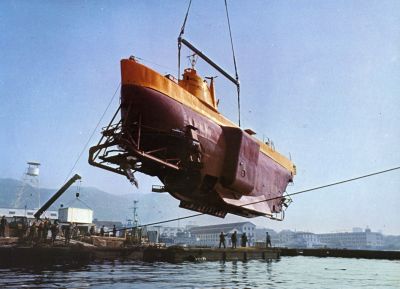The group of
researchers are using coral skeletons and sediments to analyse abrupt
climate changes in the Atlantic over the past 30,000 years. The data
collected also show how deep-sea ecosystems are affected by changes in
the ocean such as the concentration of carbon dioxide and water
circulation. The scientific crew transited from Tenerife to Trinidad,
stopping at selected sites to dive down and collect data from undersea
mountains, many of which had not been explored in any detail before. To
reach these depths, the scientists used the ISIS Remotely Operated
Vehicle (ROV), a remarkable piece of equipment which can travel far
beyond the range of human divers.
Speaking after the first dive, Dr Robinson explained: "We have
collected samples of coral skeletons from a range of depths, some of
which are likely to date back millennia. We were amazed to see the wide
array and abundance of fauna living on and around the seamount from
corals to sharks."
Pioneering research for the future
Robinson's project explores exciting new areas of oceanography. One
of the team's aims is to discover the conditions required for cold-water
deep-sea corals to survive in the central Atlantic, an area for which
data are scarce. To do this, they couple a modern ‘snapshot’ of where
and why corals live today with a historic perspective gained from
determining the age of fossil coral populations. Documenting such
information is particularly important as these ecosystems are thought to
be particularly vulnerable to changes in ocean chemistry. For example, a
parameter known as aragonite saturation, a key predictor of coral
abundance, is decreasing as the amount of carbon dioxide in the ocean
increases. Projections indicate that by 2100, around 70% of deep water
corals are likely to be living in undersaturated waters.
One of the most innovative aspects of the project is the new
geochemical techniques the scientists are using to analyse their
samples. When applied to coral skeletons and sediment from the seafloor,
these techniques should reveal ancient changes in heat and carbon
levels, particularly during times when the global climate moved rapidly
from cold to warm conditions. In another first for deep-sea research,
the ISIS ROV has taken coral skeletons from exactly the same locations
as water and sediment samples, so that they can be compared more
accurately in a single program of tests.
As our climate continues to change, their findings could help to
predict how and when ocean transformations will occur. As Dr Robinson
points out: "It is only through looking at the history of the earth's
climate that we can predict what might happen in the future."
A voyage to cross frontiers
On board the James Cook during its 48-day voyage were a team of 19
researchers, including another ERC grantee, Veerle Huvenne, who is
working on an underwater mapping project. The multidisciplinary team
brought together ideas from diverse fields, including oceanography,
geochemistry and marine biology, in order to cross frontiers in our
present knowledge of the oceans.
When asked about funding for the voyage, Dr Robinson said, "The ERC
grant has been fundamental in enabling this whole research program.
Among other things, I have used the money to hire the highly specialised
equipment aboard the James Cook and to recruit a great team. One very
important aspect of our work is creating inspirational opportunities for
the next wave of upcoming scientists in Europe and this project has
allowed me to bring together a varied and talented group of
researchers."
Dr Robinson will talk at TEDx Brussels about how the ocean's
environment has changed and what might happen in the future. She will
speak at the ERC session, starting at 2.15 pm.
 EN
EN  CS
CS DE
DE ES
ES FR
FR HU
HU IT
IT PL
PL PT
PT РУ
РУ SK
SK TR
TR УК
УК AR
AR 中文
中文







